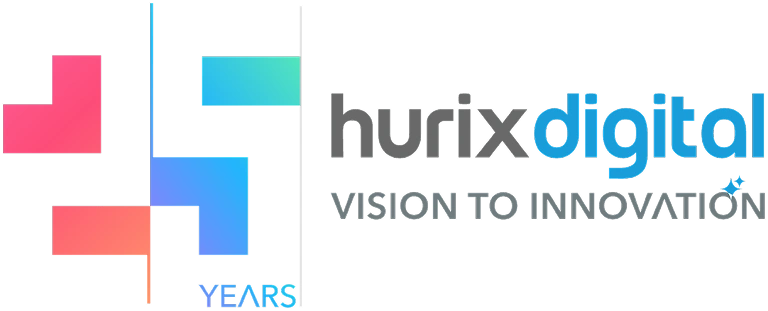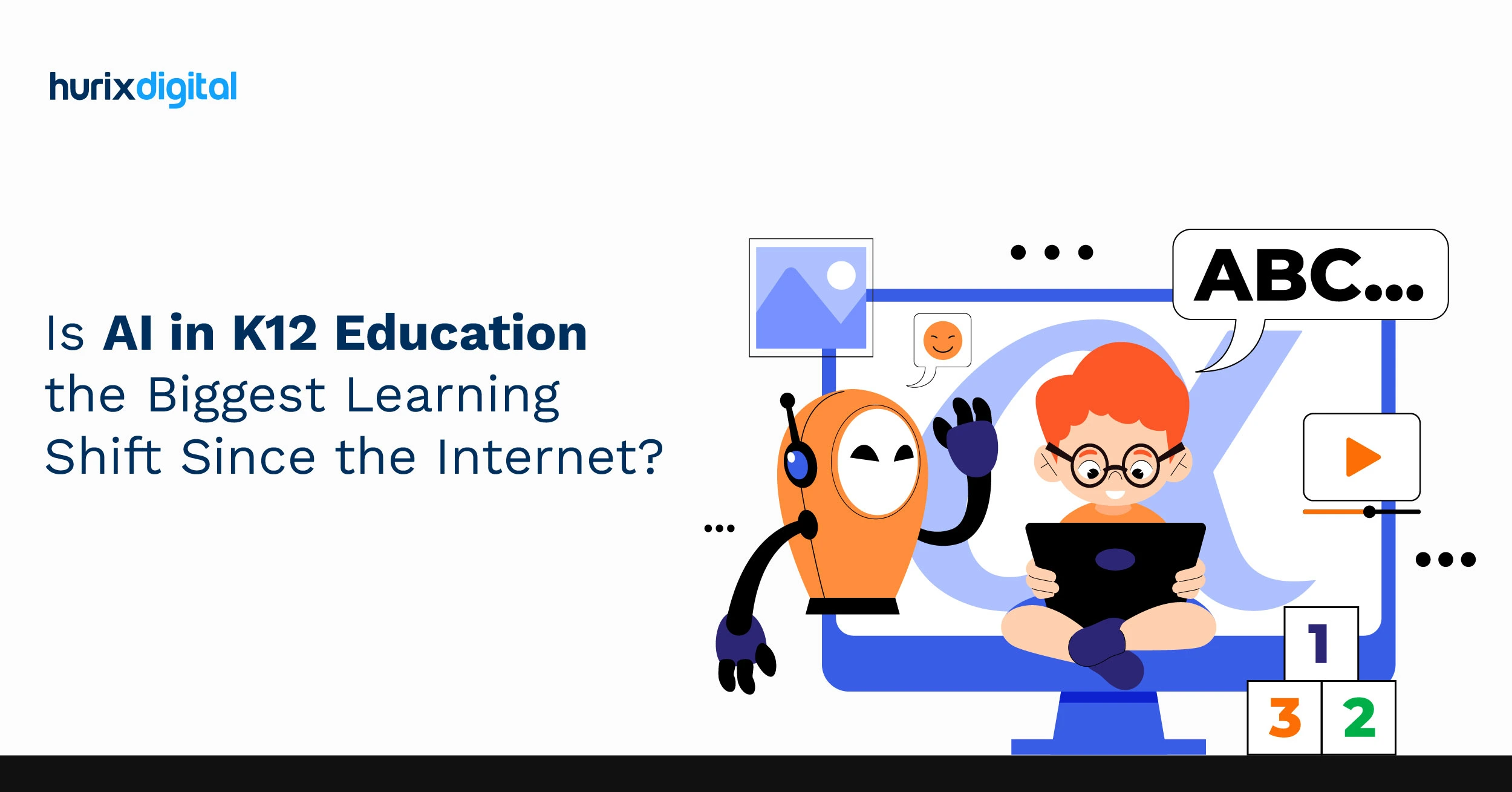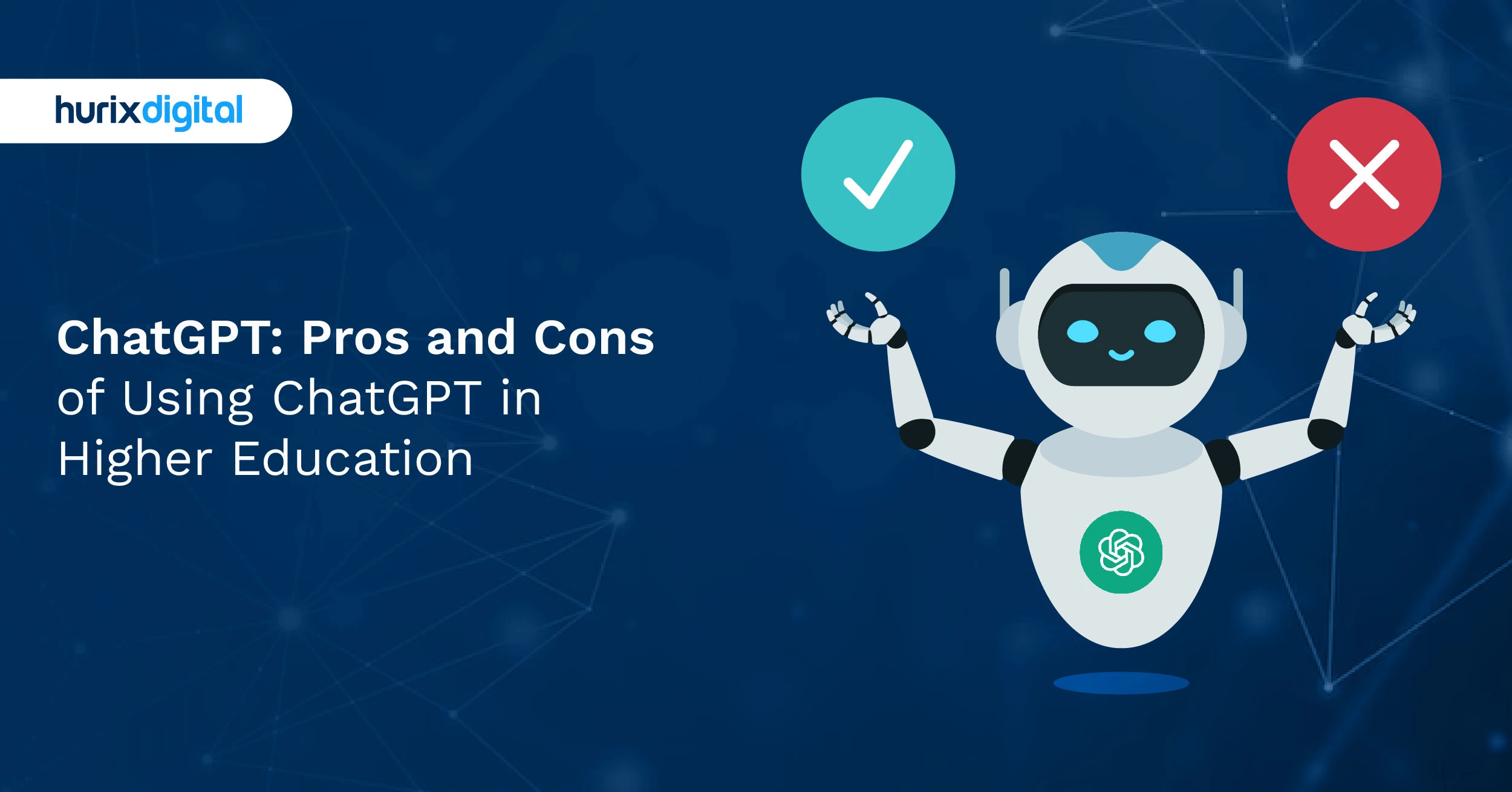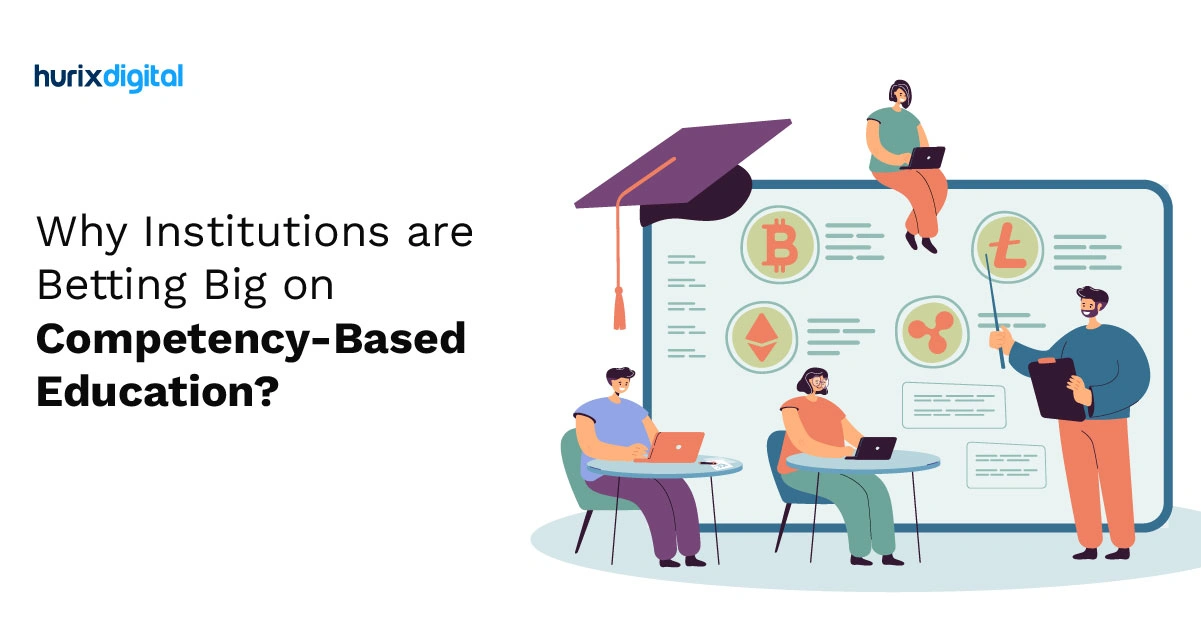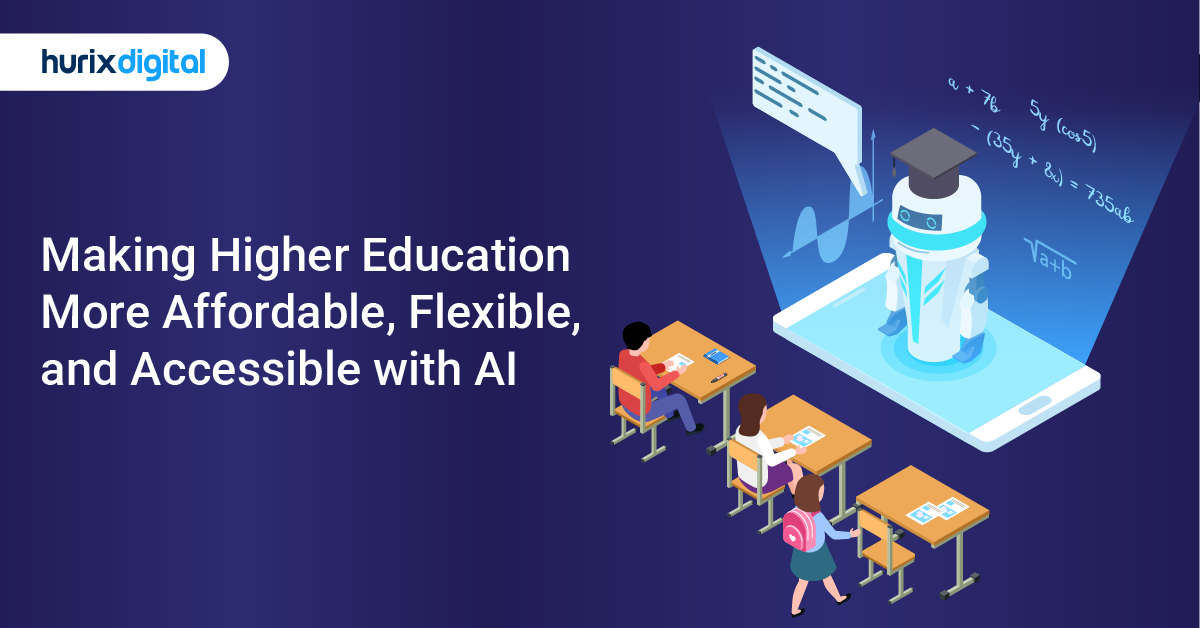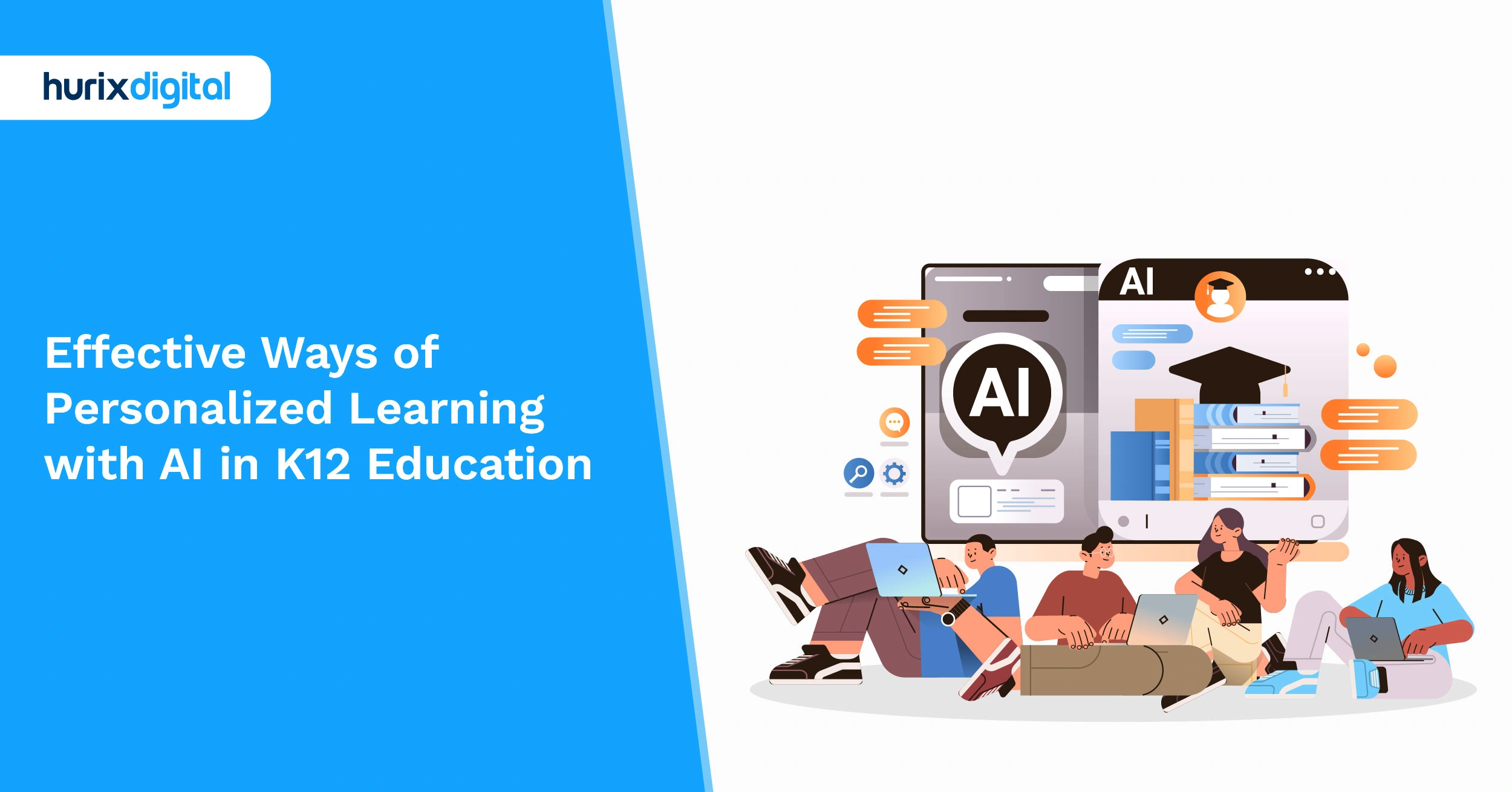
Effective Ways of Personalized Learning with AI in K12 Education
Summarize with:
Artificial intelligence (AI) is transforming education, offering innovative opportunities and challenges in K12 settings. As we navigate this transformative landscape, it’s crucial to address ethical considerations to ensure AI’s responsible and equitable use in education. Recognizing the multifaceted nature of these challenges, educators must engage in ongoing dialogue, professional development, and collaborative efforts to establish guidelines and frameworks that prioritize ethical considerations. This proactive stance involves not only anticipating potential issues but also actively seeking solutions that uphold the values of fairness, transparency, and student well-being.
In the years after the outbreak, K12 enrolment rose by 29%, according to a recent study. Even in online learning environments, where accessibility and flexibility are abundant, teachers still struggle to tailor their teachings to each individual student. In this case, artificial intelligence has the power to tip the odds. Using its data-analytic skills to understand student requirements and modify learning experiences over time, AI enables educators to personalize learning like never before.
Continue reading to discover how AI-Powered Personalized Learning has changed K12 education, its benefits, and various other teaching strategies. Educational leaders will also learn about sharing tactics and state-of-the-art AI tools to make the most of these technological breakthroughs.
Table of Contents:
- What is AI in Education?
- How Can AI Enhance Personalized Learning in the K12 Classroom?
- The Power of AI-Powered Personalized Learning
- Benefits of Personalized Learning with AI
- How Can AI Boost Engagement and Motivation in the K12 Classroom?
- How Does AI Improve Assessment and Feedback in the K12 Classroom?
- Exploring Diverse Learning Strategies in K12 Education
- AI in K12 Education: Tools for Online Learning
- Ethical Concerns and Solutions for AI in K12 Education
- Ethical Considerations of AI in K12 Education
- Wrapping Up
What is AI in Education?
AI is a broad term that encompasses various technologies and applications, such as machine learning, natural language processing, computer vision, speech recognition, and chatbots. These technologies enable machines to learn from data, understand human language, recognize images and sounds, interact with humans, and generate outputs.
AI in education can be used to perform various tasks, such as:
1. Content Creation
Based on the curriculum, learning objectives, and student preferences, K12 classroom AI integration can help create and curate educational content, such as textbooks, videos, quizzes, and games.
2. Content Delivery
AI can use various channels and formats, such as online platforms, mobile apps, virtual reality, and augmented reality, to help deliver educational content to students.
3. Content Assessment
The learning outcomes and progress of each student, such as their knowledge, skills, and competencies, can be assessed by AI, and feedback and guidance can be provided.
4. Content Analysis
AI can help analyze educational content and its impacts, such as its quality, effectiveness, and engagement, and provide insights and suggestions for improvement.
How Can AI Enhance Personalized Learning in the K12 Classroom?
Personalized learning is a student-centered approach that tailors the learning experience to each student’s individual needs, preferences, and goals. It can improve student outcomes, motivation, and satisfaction, as well as reduce dropout rates and achievement gaps.
However, personalized learning is not easy to implement in the traditional K12 classroom, where teachers have to deal with large and diverse groups of students with limited time and resources. This is where AI-Powered Personalized Learning comes in, acting as a powerful tool to bridge this gap.
The Power of AI-Powered Personalized Learning
A learner-specific strategy is replacing the one-size-fits-all concept with edtech advancements and the impact of artificial intelligence. AI algorithms can identify unique learning preferences, strengths, weaknesses, and styles by analyzing student data. With this thorough understanding, teachers may create personalized learning experiences tailored to the needs of individual students.
1. Customized Learning Paths
Artificial intelligence creates individualized learning routes based on student data, including learning preferences, skills, and shortcomings. This ensures that pupils can grow at their own rate and are suitably challenged.
2. Adaptive Assessments
AI-driven assessments move beyond traditional tests by adjusting question difficulty and content based on a student’s performance. This leads to a more accurate evaluation of comprehension and helps customize instruction for each student.
3. Immediate Feedback and Assistance
AI tutors and chatbots provide instant feedback on assignments, address queries, and offer assistance. This feature bridges the gap in online learning settings by providing guidance and support whenever students need it.
4. Interactive Learning Experiences
AI personalizes learning materials by suggesting activities, games, and simulations that match students’ interests and preferred ways of learning. Consequently, this enhances engagement levels and deepens understanding.
5. Support for Social and Emotional Learning (SEL)
AI can analyze how students interact with others and their behaviors to recognize emotional patterns and deliver personalized SEL support. This assists students in developing essential life skills for well-being.
6. Student-Centered Learning
AI enables students to take charge of their education through tools for setting goals, self-assessment, and creating learning paths. This encourages self-reliance and the development of critical thinking abilities.
Benefits of Personalized Learning with AI
Personalized learning, powered by AI, offers a multitude of advantages for both students and educators. By tailoring instruction to individual needs, AI can significantly enhance student engagement and motivation. Research shows that students in personalized learning environments demonstrate higher levels of academic achievement and critical thinking skills.
Additionally, AI can help to reduce learning gaps and improve outcomes for students from diverse backgrounds. By optimizing the learning process for each individual, AI-powered personalized learning has the potential to revolutionize K12 education.
Integrating AI in Classroom Management brings numerous benefits:
| Benefit | Description |
| Enhanced Student Engagement | Personalized learning experiences cater to individual interests and learning styles, leading to increased student engagement and motivation. |
| Improved Learning Outcomes | AI-powered learning helps students achieve better academic results by providing targeted instruction and addressing individual needs. |
| Efficient Use of Resources | AI automates tasks like content recommendation and progress tracking, freeing up educators’ time to focus on higher-order learning activities. |
| Equity and Accessibility in Education | AI can help create a more inclusive learning environment by effectively customizing lessons to each student’s learning needs and background. |
Additionally, AI closes learning gaps and improves performance for students from diverse backgrounds. Therefore, it is imperative that those in charge of online education and experts in the field actively incorporate AI-driven technologies into their curricula. This entails using AI technology and ensuring teachers receive the training necessary to use it to meet their students’ various learning demands.
How Can AI Boost Engagement and Motivation in the K12 Classroom?
Engagement and motivation are key factors that influence students’ learning processes and outcomes. A student’s engagement in a learning activity refers to their attention, interest, and involvement, while motivation refers to their desire, willingness, and effort. However, these are often low in the traditional K12 classroom, where students have to follow a one-size-fits-all curriculum.
AI can help overcome this challenge and boost engagement and motivation in the K12 classroom by:
1. Making Learning Fun and Interactive
AI-powered education solutions can help make learning fun and interactive by using gamification, storytelling, and social elements, such as points, levels, badges, leaderboards, avatars, narratives, and peer interactions. It can also help make learning immersive and realistic by using virtual and augmented reality, which can create simulated and enhanced learning environments.
2. Making Learning Relevant and Meaningful
AI can help make learning relevant and meaningful by utilizing real-world examples, scenarios, and problems relevant to the student’s interests, needs, and goals. Data and analytics based on a student’s background, preferences, and performance can also help AI make learning contextual and personalized.
3. Making Learning Challenging and Rewarding
To make learning challenging and rewarding, artificial intelligence can use adaptive and dynamic methods that adjust the difficulty and complexity of the learning content and activity based on the level and progress of the student. Furthermore, AI can be used to provide students with learning feedback and recognition through timely and constructive methods, providing them with information, guidance, praise, and rewards.
How Does AI Improve Assessment and Feedback in the K12 Classroom?
Assessment and feedback are often ineffective and inefficient in the traditional K-12 classroom. Teachers frequently rely on standardized and summative tests that are infrequent, time-consuming, and stressful, providing limited and delayed information. AI in K12 classrooms can help overcome this challenge and improve assessment and feedback.
1. Providing Continuous and Formative Assessment
Artificial intelligence for assessment can monitor and measure each student’s learning outcomes and progress throughout the learning process, rather than only at the end. It can also help provide adaptive and dynamic assessments that adjust the type and difficulty of the assessment content and activity based on the student’s level and progress.
2. Providing Immediate and Actionable Feedback
Students can benefit from immediate, actionable feedback as soon as they complete an assessment activity, rather than waiting for a long time. In addition to providing tailored and constructive feedback, AI can also provide specific and relevant information and guidance based on the student’s learning needs.
Exploring Diverse Learning Strategies in K12 Education
While AI-Powered Personalized Learning offers a technological framework, its effectiveness is amplified when combined with proven pedagogical strategies. These methods empower students, foster essential skills, and create dynamic learning environments that AI can further enhance and personalize.
Inquiry-Based Learning (IBL) for Critical Thinking
Inquiry-based K12 solutions flip the traditional script by placing questions at the heart of the learning experience. This student-driven approach fosters critical thinking, problem-solving skills, and a natural curiosity for exploration. Instead of being passive recipients of information, students actively participate by asking questions, investigating, and seeking solutions. The core principles of IBL are that it is student-centered, problem-based, collaborative, and reflective. It develops critical thinking, sharpens problem-solving, and deepens understanding beyond superficial facts.
Project-Based Learning (PBL) for Practical Skills
Project-based learning (PBL) is another dynamic, student-centric pedagogy that goes beyond memorization. It requires students to solve a complex problem or question over a certain period through investigation and collaboration. A study indicates that PBL significantly impacts interest in lessons and creative thinking. This model improves communication, fosters seamless collaboration, and enhances creativity as students work on hands-on solutions to realistic challenges.
Competency-Based Learning (CBL) for Mastery
Also known as mastery-based learning, competency-based learning (CBL) personalizes education by allowing student advancement based on the proficiency of skills, not seat time. This ensures students learn at their own pace, focusing on mastering knowledge. In CBL, grading indicates the degree of mastery, and if a student fails, records specify which competencies need re-learning, not the entire course. As per eLearning statistics, 82% of US educational institutions have implemented or are adopting CBE programs.
Hybrid and Blended Learning Models
The K12 sector has evolved rapidly, with US news reporting that over 30% of students engaged in hybrid learning post-pandemic. This model blends online and offline instruction, offering flexibility and diverse content delivery. A key example is the Flipped Classroom, where students learn theory at home via videos and practice it in class with teacher guidance. This approach, like the SVHS AlwaysOnline™ Curriculum, personalizes learning and allows teachers to facilitate interactive discussions and projects.
Outdoor and Holistic Learning
Education can also extend beyond classroom walls. K12 learning outdoors emphasizes hands-on experiences in nature, which turns knowledge experiential and promotes collaborative skills. Activities like nature walks, camping, and community projects help manage stress by reducing cortisol levels, as noted in a survey by Harvard Health. This holistic approach, which also includes extracurriculars, develops well-rounded individuals by nurturing physical health, environmental awareness, and social responsibility.
AI in K12 Education: Tools for Online Learning
Here is an extensive look at some of the most significant AI-powered teaching technologies that are revolutionizing K12 education:
1. Intelligent Tutoring Systems (ITS)
ITS virtual tutors use artificial intelligence to deliver individualized education. They review students’ responses, spot frequent errors, and customize the course content to meet each student’s needs and skill levels.
2. Automated Content Personalization
This application evaluates student performance and preferences using artificial intelligence and suggests educational resources, such as articles and videos, based on each student’s individual interests and abilities.
3. Adaptive AI Learning Platforms
These platforms make sure that every student is adequately challenged and supported by utilizing AI algorithms to modify the speed and difficulty of learning content based on each student’s progress.
4. Student Emotion Detection Tools
By identifying emotional states from student expressions, speech tones, and engagement patterns, AI-powered emotion detection systems enable teachers to customize lessons and provide the right kind of assistance.
In light of this, heads of online learning and education are essential to the effective implementation of these AI-powered teaching resources. They must actively use these technologies to support their institution’s educational objectives and comprehend their potential.
Ethical Concerns and Solutions for AI in K12 Education
Below are the key ethical considerations when integrating AI into K12 education:
1. Transparency in AI Algorithms
One of the primary ethical challenges revolves around the potential biases embedded within AI algorithms. These algorithms are often complex and opaque, making it difficult to know how they work. That’s why it’s crucial to examine and address these biases to ensure a fair learning environment.
Here are some tips to help you:
- Focus on creating AI systems that are bias-aware, transparent, and audited for fairness.
- Conduct rigorous testing of AI solutions to identify and mitigate biases before deploying them.
- Encourage open discussions with students and educators about the functioning of AI systems.
- Enable users to question, challenge, correct AI systems, and even opt out if they choose to do so.
2. Student Data Protection
Educational AI applications rely on large amounts of student data. While personalizing education might be a great idea, it can also threaten student privacy. For instance, data hacking can expose students to identity theft or manipulation. That’s why ensuring robust student data protection becomes essential. Follow these measures to safeguard digital data:
- Ensure compliance with data protection regulations like FERPA and COPPA.
- Use end-to-end encryption and multi-factor authorization to restrict unauthorized access.
- Follow the principles of data minimization and consent management.
- Educate students about the importance of data privacy and empower them to make informed choices.
3. Inclusive AI Education
AI education can face barriers and gaps that limit its reach. Without inclusivity, AI-powered tools may favor certain groups over others, leading to unequal educational experiences.
Here are some ways to provide diverse and inclusive AI education:
- Blend AI ethics, accessibility, inclusivity, and diversity principles into the curriculum.
- Promote discussions on online safety and empathy-driven digital citizenship education.
- Make AI learning accessible and affordable, regardless of the student’s background or abilities.
- Encourage participation from underrepresented and marginalized communities.
4. Impact on Human Teachers
AI in education can augment the role and capabilities of human teachers. Yet, it may raise concerns about their possible replacement. So, how do you ensure AI does not compete with human teachers? Consider the given points:
- Emphasize the supportive role of AI as a tool to enhance, not replace, human educators.
- Advocate for human oversight in AI-powered assessment to justify and interpret results.
- Make sure that AI reduces administrative tasks, helping teachers concentrate on providing personalized instruction.
5. AI Awareness for Educators
Teachers might need more expertise to navigate the ethical challenges of AI in schools. This knowledge gap can hinder their ability to approach AI-related concerns. Providing ongoing professional development opportunities can empower educators and tailor programs to offer AI awareness on topics like AI fundamentals, ethics, and practical integration strategies.
Ethical Considerations of AI in K12 Education
As you can see, AI in K12 education can raise ethical concerns for students, educators, and society. That’s why you must assess its potential risks and implications. Here are some steps to guide you:
Step 1: Define the Scope and Objectives of the AI System
Begin by defining the issue or opportunity the AI solution seeks to address. Identify the intended users, expected outcomes, and anticipated benefits. This foundational step sets the stage for a nuanced understanding of the ethical landscape.
Step 2: Identify the Ethical Issues and Risks
Scrutinize the AI system for potential ethical implications. Identify sources of concern, such as transparency, privacy, and fairness. A comprehensive evaluation of these issues is imperative to proactively address ethical challenges.
Step 3: Apply the Relevant Principles
Ensure that the AI system aligns with established ethical criteria. Check its adherence to globally recognized standards, such as the UNESCO AI Ethics Recommendation or the ISTE AI Standards. This step fosters a commitment to ethical practices and principles.
Step 4: Enforce the Practical and Ethical Strategies
Identify and employ suitable techniques, such as data auditing and human oversight, to address ethical concerns effectively. Determine how these methods can be integrated into the AI system to detect, measure, and mitigate potential issues, reinforcing ethical safeguards.
Step 5: Observe and Assess the Performance of the System
Establish a framework to continuously observe the ethical impact of the AI system. Utilize data and insights to assess its performance and identify areas for improvement. Organizations can optimize the system to ensure ethical outcomes and foster a responsible AI environment in K12 education by maintaining a vigilant stance.
Wrapping Up
There’s no denying that AI applications for K12 will eventually be used to effect change. Teachers can use AI technology to personalize learning experiences for each student, boosting academic achievement and student engagement. Ultimately, AI-driven solutions simplify activities, enable progress tracking, and offer prompt help, freeing up teachers’ time to concentrate on creating a safe and productive virtual learning environment.
Hurix Digital is a unique provider of content delivery systems and AI-powered platforms for educational applications. We work collaboratively with academic institutions to develop learning experiences that let students realize their greatest potential.
Schedule a meeting with our experts right away to talk about how AI can enhance the customization of your K12 online learning environment.
Summarize with:

Senior Vice President
A Business Development professional with >20 years of experience with strong capability to sell new solutions and develop new markets from scratch. New Market Entry Specialist with experience working in the largest emerging markets. Exceptional experience in conceptualizing, ideating and selling new learning technologies like VR AR, etc. across multiple industry verticals.
 A Space for Thoughtful
A Space for Thoughtful 